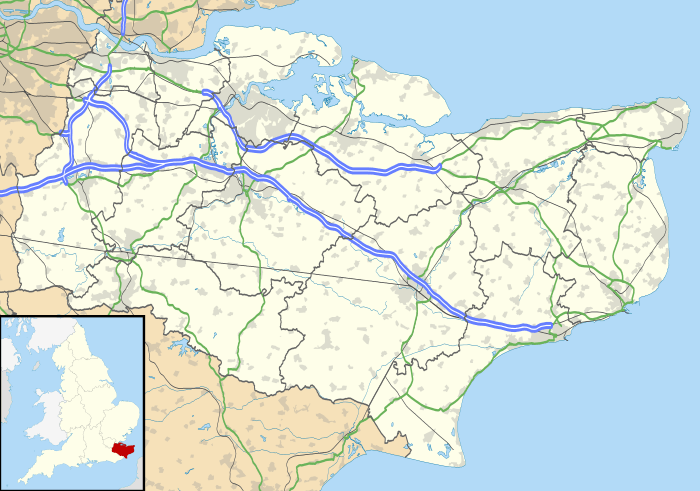Ebbsfleet, Thanet
Ebbsfleet is a hamlet near Ramsgate, Kent, at the head of Pegwell Bay. Historically it was a peninsula on the southern coast of the Isle of Thanet, marking the eastern end of the Wantsum Channel that separated Thanet from the Kentish mainland. It is in the civil parish of Minster
- Not to be confused with Ebbsfleet Valley in northwest Kent.
| Ebbsfleet | |
|---|---|
 Farmland at Ebbsfleet, with Richborough Power Station in the distance (prior to the demolition of the towers) | |
 Ebbsfleet Location within Kent | |
| OS grid reference | TR333631 |
| Civil parish | |
| District | |
| Shire county | |
| Region | |
| Country | England |
| Sovereign state | United Kingdom |
| Post town | RAMSGATE |
| Postcode district | CT12 |
| Police | Kent |
| Fire | Kent |
| Ambulance | South East Coast |
| UK Parliament | |
Since Pegwell Bay was a natural harbour on the part of the coast nearest to the Continent, Ebbsfleet is said to have been the site of three important arrivals in English history: Julius Caesar in 54BC built a 20 ha fort during his incursion; Hengist and Horsa in 449 AD, who led the English in their conquest of Britain; and Augustine of Canterbury in 597 AD, who converted much of England to Christianity.
Ebbsfleet is the titular see of the Bishop of Ebbsfleet, an episcopal visitor for the Province of Canterbury.
Geography
Ebbsfleet Lane marks the line of the peninsula today. The Wantsum Channel silted up and was reclaimed in the 15th century; all that remains of it is the channel of the River Stour, which enters the sea by Richborough Power Station. There are a couple of houses and Ebbsfleet House at Stonelees, where Ebbsfleet Lane meets the Sandwich road, and Ebbsfleet Farm on the hill behind.
History
There are prehistoric, Iron Age, Roman, and Saxon settlement remains on the peninsula around Ebbsfleet Farm, which may have also been the landing stage for the Roman ferry across the channel to Richborough. Archaeologists suggest that Pegwell Bay was the site of both Roman invasions of Britain.[1] Claudius landed his army at Richborough on the other side of the channel, to start his invasion of 43 AD, and it became a major port of Roman Britain.
According to the Anglo-Saxon Chronicle it is also the site of the landings made by the Saxons in the fifth century AD; an entry states that Hengist and Horsa, on the invitation of Vortigern, King of the Britons, landed in 449 at Eopwinesfleot, usually assumed to be Ebbsfleet.[2] A fleot is a creek and Eopwine is a Germanic personal name; the modern Ebbsfleet may have developed from Eoppa/Eobba, a short form of this name.[3] There is the common sense possible alternative derivation from the Old English 'ebbian' , to move away from (of West Germanic source) describing the twice daily phenomenon of all the water in the Wantsum channel 'moving away' from land at this outlet to the sea.[4] A third possibility is that Eopwines represents a corruption of the last three syllables of Portus Rutupinus, the Latin name of the ancient Wantsum Channel.[5] The arrival of the Saxons is commemorated by a monument and replica longship up the coast at Cliffsend. The Battle of Wippedesfleot between the Britons and the English in 465 is thought to have taken place at Ebbsfleet.
Bede wrote in his Ecclesiastical History: "On the east of Kent is the large Isle of Thanet containing, according to the English way of reckoning, 600 families, divided from the other land by the river Wantsum, which is about three furlongs over, and fordable only in two places, for both ends of it run into the sea. In this island landed the servant of our Lord, Augustine, and his companions, being, as is reported, nearly forty men. They had, by order of the blessed Pope Gregory, taken interpreters of the nation of the Franks."
This has been interpreted to mean Ebbsfleet was where Augustine landed. In 1884, St Augustine's Cross was erected on the lane between Cliffsend and Sevenscore to commemorate his first sermon in Kent.[6]
Energy
Richborough Power Station to the south was operational from 1962 to 1996; the towers were demolished in 2012. The power lines are being reused for the Thanet Wind Farm in the sea off Broadstairs.
Ebbsfleet Solar Farm is on the site of the former Richborough Power Station. It has a capacity of 4.9 MWp and became operational in 2011.[7] The solar farm is part of a larger ongoing project, Richborough Energy Park.
Archaeology
The site of Julius Caesar's landing in Britain on 4 July 54 BC had been a source of dispute. It was assumed that a fort would have been built to protect the landing, and none had been found. On 29 November 2017, archaeologists from University of Leicester announced that during the excavation they had done at Ebbsfleet, fortifications had been found.[8]
Notes
- Sample, Ian (29 November 2017). "Caesar's invasion of Britain began from Pegwell Bay in Kent, say archaeologists". The Guardian. Retrieved 29 November 2017.
- Keith Briggs, The two Ebbsfleets in Kent. Journal of the English Place-Name Society 44, 5–9
- McClure, Edmund (1910). British Place-Names in their Historical Setting. The Society for Promoting Christian Knowledge. pp. 132–3.
- https://en.oxforddictionaries.com/definition/ebb
- Haverfield, F. J. (1932). Victoria County History of Kent Vol. 3, Romano-British Kent - Military History. Kent Archaeological Society. pp. 38–9.
- Date and text of the inscription.
- Ebbsfleet Solar Farm
- "First evidence for Julius Caesar's invasion of Britain discovered — University of Leicester". www2.le.ac.uk. Retrieved 29 November 2017.
